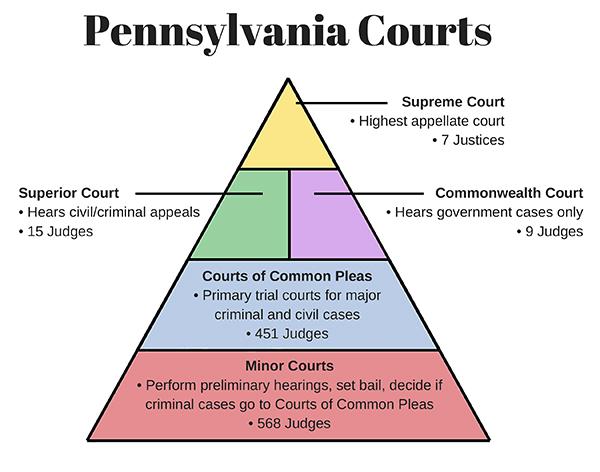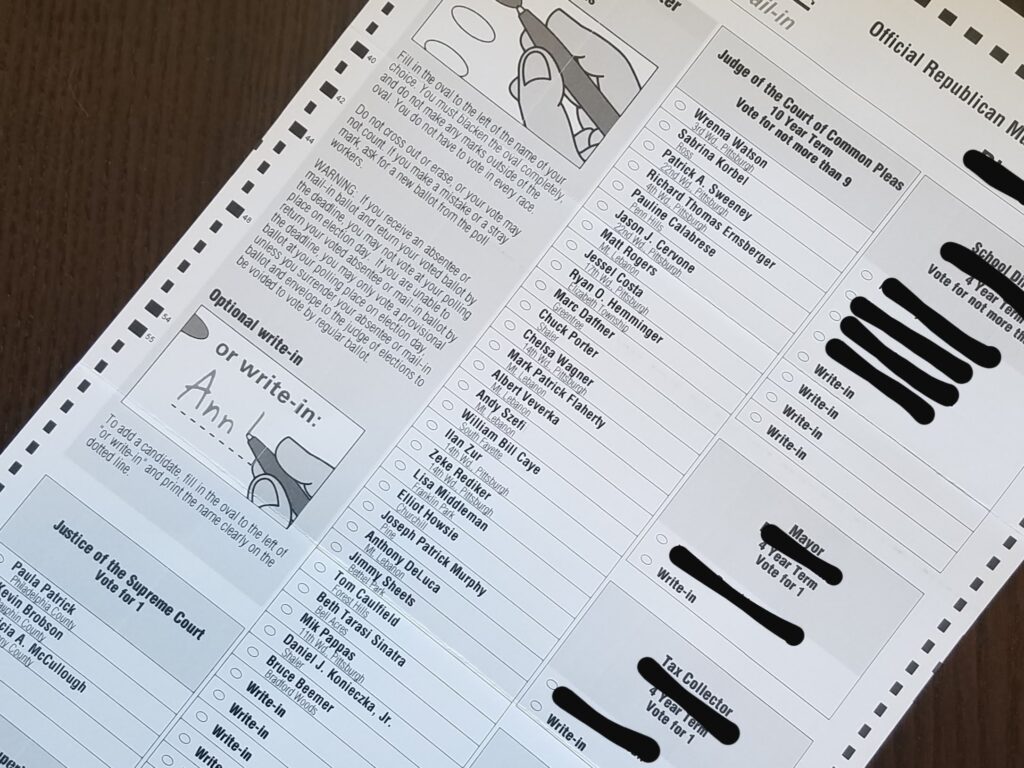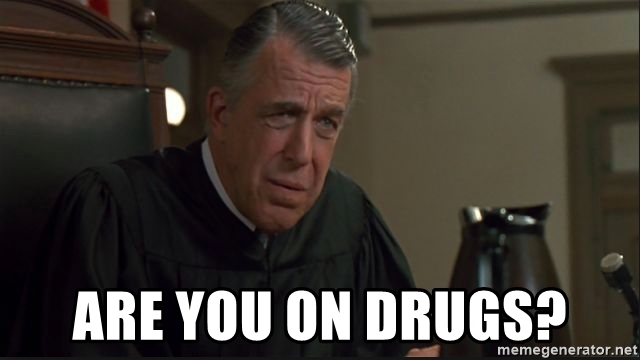I certainly didn’t intend for this topic to run over into a third post, but there is a lot going on in this May’s primary elections. In addition to the high-priority statewide ballot questions, we’ve got several judicial races. On May 18 (or before for mail-in ballots), voters will choose candidates for the three statewide courts: PA Supreme Court (the highest appellate court in the state), the PA Superior Court (which hears civil and criminal appeals), and the PA Commonwealth Court (which hears government cases). I have previously written about the hierarchy of the Pennsylvania court system [1] so I will not repeat myself here.
What I am going to focus on in this post is the race for the Allegheny County Court of Common Pleas, in which there are 39 candidates vying for nine open seats. I don’t recall ever seeing this many candidates on my ballot for any race before, and I can’t imagine the anxiety I would feel being presented with this list in the voting booth. This year especially I am grateful for having a mail-in ballot because it gives me the time I absolutely need to evaluate everyone on this list.
As usual, the information in my resource spreadsheet (at the bottom of this post) isn’t exhaustive. I am registered Republican, and I never have the time research candidates who won’t be on my ballot, despite requests from some friends who are registered Democrat. However, since there are so many cross-listed judges in the Allegheny County Common Pleas race (all 39 on the Democratic ballot, 28 on the Republican ballot), I have included all of them – just this once!

Image credit: [2]
Common Pleas Court
First, a little background on this court because I wasn’t entirely clear what it was. I recognize that just that statement alone shows my privilege. Most of the people I know who have been to court are attorneys, not those represented by them. I am aware that – generally speaking – I have greater access to ballot information, time to research, transportation to the polls, and work flexibility on election day than do many others, and that those factors increase my chances of casting a ballot (and an informed one at that). I am also aware that the absence of those same factors limits voters’ ability to cast ballots, and again – generally speaking – those voters may be the most impacted by judge selection.
This court is responsible for appeals from minor courts (which handle summary offenses, small civil claims, and landlord-tenant matters). It is also where most misdemeanor and felony criminal cases are handled, as well as larger civil cases. Orphan’s Court issues and family law matters, such as custody, divorce, and support are also addressed in Common Pleas Court.[3] Covering this many issues requires a lot of judges. There are 451 judges in the PA Courts of Common Pleas, and the system is divided into 60 judicial districts. Depending on the size of the district, it may have as few as one or as many as 93 judges.[4] Allegheny County has 46 judges, seven of whom are senior judges.[5]
Common Pleas judges can join the court by being elected or appointed. If elected for a 10-year term, judges can seek retention for another 10-year term, which shows up as a yes/no vote on the ballot. It is exceedingly rare for a judge not to be retained or for a bar association not to recommend retention. As we will see, there is extremely little visibility into any information that could help a voter decide whom to vote for. If there is a vacancy on the bench because of retirement, resignation, or death, for example, the Governor can appoint a judge to fill the vacancy.[6] The appointment must be confirmed by the State Senate. Judicial appointments are purely political.
In the Voting Booth
Several websites and articles covering this massive race have directed readers to the Allegheny County Bar Association’s published ratings of the various candidates. As voters have very little information on what makes a good judge in the first place and whether or not each of these candidates has “the right stuff,” these ratings are probably what most voters will use to make their decisions. However, I have been assured by my friends who see how the sausage is made that the ratings are influenced by personal connections. (I’m sure you’re shocked by this information.)

Because the whole judicial branch is incredibly concealed, and because the Bar Association ratings are not necessarily objective, there is virtually no way of knowing the pros and cons of the various candidates unless you (or someone you know) have had personal interactions with them. It’s also difficult for lawyers to come out and share negative feedback about judges because pissing off someone who gets elected or retained could permanently damage not only their own career but the interests of their clients as well.
My friends who work in the county court system have provided me with a lot of insight for this post and for my ballot choices. While I am not in the business of making voting recommendations on this blog, I do try to provide information that will help people make their own decisions. I have received some recommendations for and against some (not all) of the candidates based on my friends’ personal interactions with them, and you can find that feedback in my election spreadsheet below.
As for the rest of the candidates, my friends have also provided guidance on what to look for when making a decision. The general public is largely unaware of what characteristics make someone a good judge and uninformed about whether a candidate even measures up to those criteria. My goal, with the help of my attorney friends, is to explain what factors could support certain priorities. By learning how to evaluate candidates, I know I will feel better-prepared for future elections – not just this one.
What Makes a Good Judge?
So much of our image of lawyers comes from popular culture: courtroom dramas on TV and in movies. However, the field of law is extremely broad, and not all lawyers have courtroom experience. Even though most lawyers consider themselves litigators (trial lawyers), less than 2% of civil cases actually go to trial, and their time is still largely spent outside the courtroom.[7] The more actual courtroom experience a candidate has, the more perspective that candidate will be able to bring to the bench, having dealt with a variety of judges over the years.

Image credit: [8]
According to one of my friends, there is a growing complaint about the trend in federal appointments of justices who don’t have any actual court room experience. The only Supreme Court justices with it are Sotomayor, who was formerly a prosecutor, and Alito, who served as the U.S. attorney for the District of New Jersey. Everyone else on that bench is an academic, appellate attorney, government attorney, or corporate attorney, none of which do trial litigation. The same holds true with a lot of federal appointments in lower courts, as well.
It seems that many/most of us assume that all judges have had experience arguing in court or working in the weeds of representing individual humans (not corporate entities), but that isn’t the case. For a Court of Common Pleas judge, who will see so many cases that are tied to home and family, there is really no substitute for courtroom experience, but many voters don’t even realize that’s something to look for in a candidate.
When it comes to evaluating a candidate’s courtroom experience, there are certainly different types of roles someone may have held. How you should vote depends on what you’re looking for in a judge. For example, if you prefer judges who will be harsh on crime, you should be looking for former prosecutors and experience in at Attorney General’s office. If you want a judge who is more focused on rehabilitation than punishment, you should be looking for candidates with experience as a public defender or with a non-profit advocacy group. Again, candidates whose work involves interacting with real people (as private attorneys, public defenders, and district attorneys do) will bring with them a greater understanding of the court.
Finally, as with all politics, I was cautioned to watch out for nepotism. It happens everywhere, but it’s no surprise that a lot of families in Pittsburgh run for positions, get elected on name recognition, and continue to do that for generations. In this race in particular, Costa, DeLuca, Flaherty, Watson, and probably some others are all related to former judges. That doesn’t necessarily mean that you shouldn’t vote for someone who has family in the same line of work; just make sure that’s not the only reason you’re voting for them.
~
And with that, I will leave you to your research. Below you will find my election spreadsheet, which includes information on all 39 Allegheny County Court of Common Pleas candidates. Best of luck!
As always, I welcome thoughts, concerns, and civil discussion below.
Thanks for reading!
[1] https://radicalmoderate.online/november-2019-election-guide-part-1/
[2] https://whyy.org/articles/explainer-how-does-pas-court-system-work/
[3] https://ballotpedia.org/Pennsylvania_Court_of_Common_Pleas
[4] http://www.pacourts.us/learn/
[5] https://ballotpedia.org/Allegheny_County_Court_of_Common_Pleas,_Pennsylvania
[6] https://ballotpedia.org/Pennsylvania_Court_of_Common_Pleas
[7] https://www.thebalancecareers.com/myths-regarding-the-practice-of-law-2164697
[8] https://memegenerator.net/instance/67902983/judge-fred-gwynn-are-you-on-drugs
0 Comments